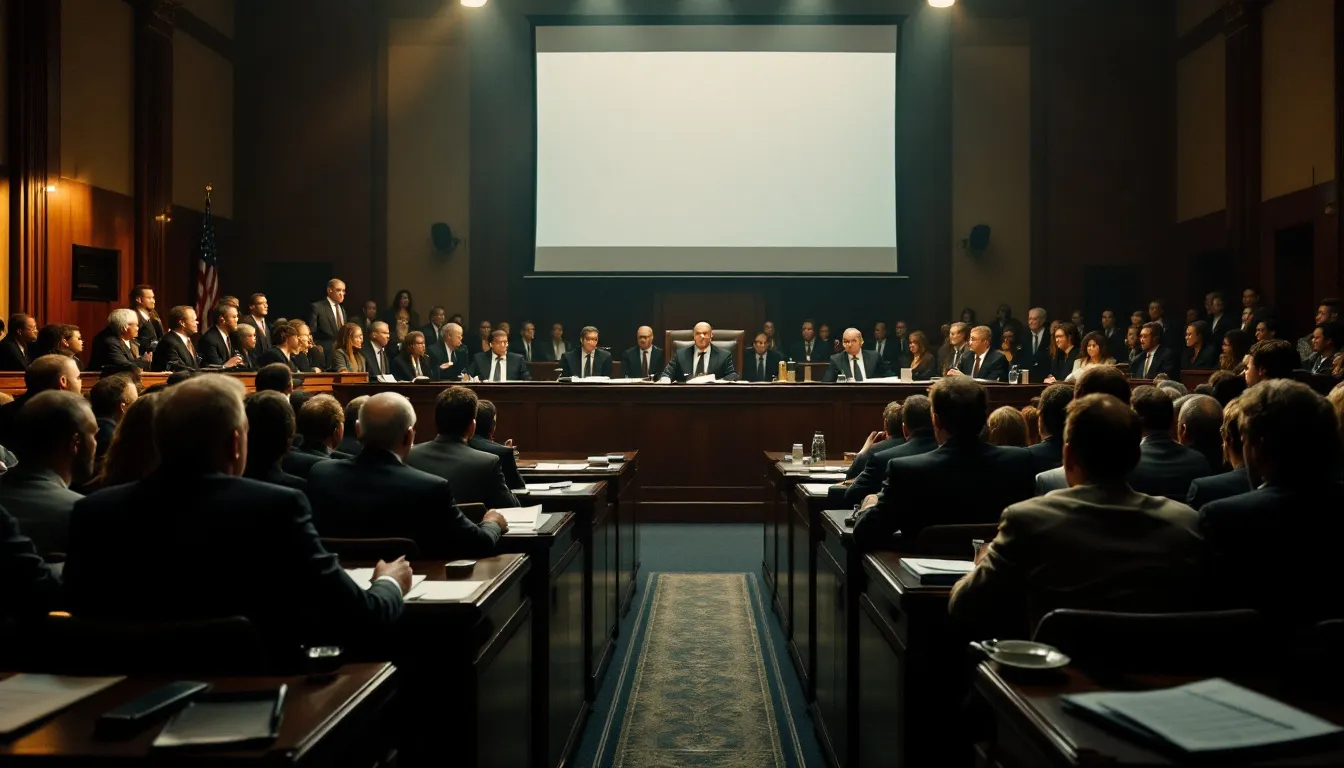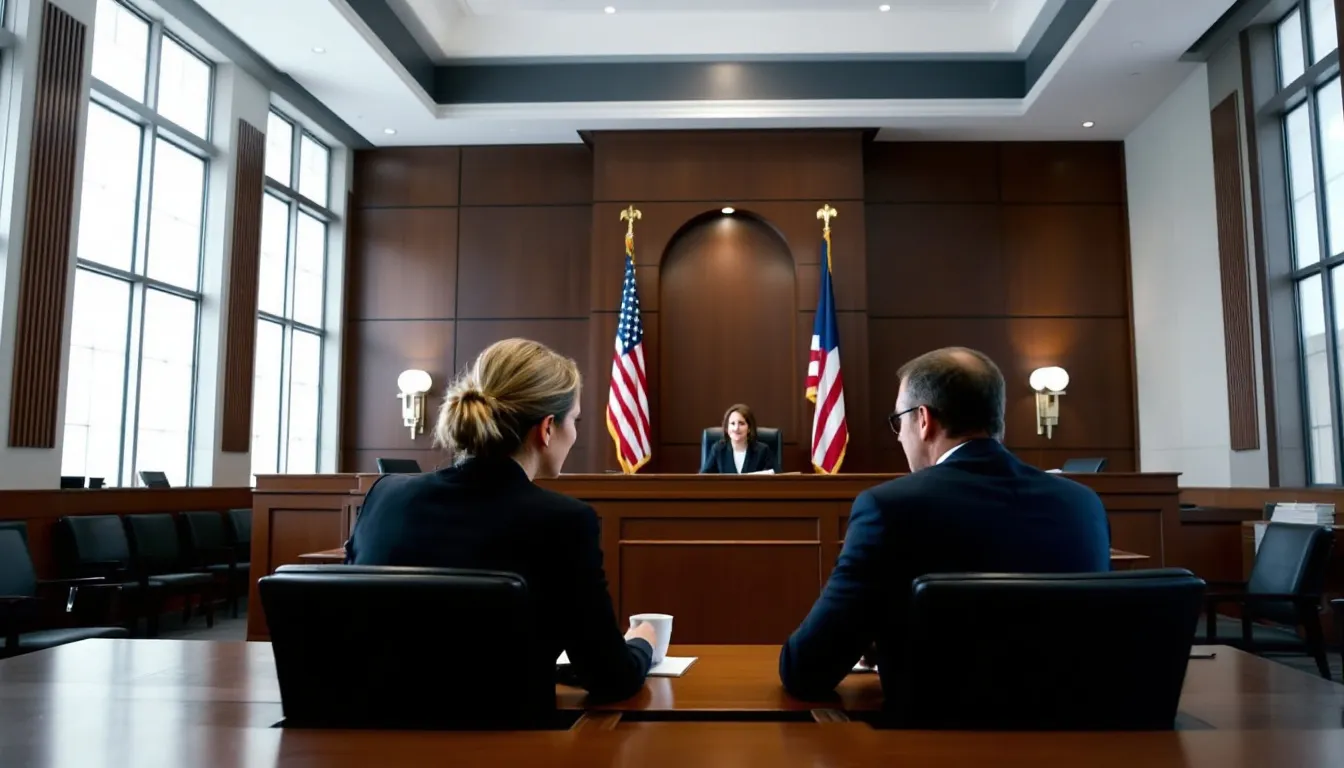Top California Inheritance Dispute Lawyer for Your Claim
Facing an inheritance dispute in California? A California inheritance dispute lawyer can guide you through understanding your rights and the legal process. This article will explain common dispute causes, legal contest grounds, and resolution steps.
Ready to connect with a trusted California Inheritance Dispute Lawyer? Contact Andrew Gilliland at Gilliland Law by calling (760) 918-5630 or reaching out online to schedule your free initial consultation today.
Key Takeaways
Inheritance disputes in California often arise from issues like unclear asset distribution, mistaken disinheritance, and emotional family tensions, particularly when no valid will exists.
Key legal grounds for contesting inheritances include undue influence, lack of testamentary capacity, and fraudulent actions, necessitating the need for legal representation.
Andrew Gilliland Law specializes in inheritance disputes, providing expert legal strategies and clear communication to guide clients through the complexities of probate law and conflict resolution.
Understanding Inheritance Disputes in California

Inheritance disputes arise when heirs disagree about the distribution of a decedent's estate. Inheritance disputes often arise after the death of a loved one, which triggers the process of estate distribution and can lead to disagreements. These conflicts can stem from various sources, such as:
Claims of mistaken disinheritance by omitted family members
Unequal asset distribution, which often leads to beneficiary resentment and exacerbates tensions
Long-standing sibling rivalries that frequently resurface during inheritance discussions, complicating relationships further
Disputes often occur when there is no valid will or estate plan, leading to uncertainties about asset distribution. The lack of clear directives can cause significant friction among heirs. Additionally, disagreements over property valuation can complicate the inheritance process, especially when real estates are involved, and these estate disputes can become disputed.
The emotional toll of losing a loved one can compound the stress of inheritance disputes, often leaving family members feeling betrayed or unfairly treated, which can result in long-lasting rifts. Effective resolution addresses both legal aspects and helps mend family relationships. Recognizing the common causes and impacts of inheritance disputes is crucial for finding a resolution.
Understanding California Inheritance Laws
California inheritance laws are designed to ensure that a decedent's estate is distributed according to their wishes and in compliance with state regulations. These laws play a vital role in protecting the rightful inheritance of beneficiaries and guiding the probate process. However, inheritance disputes often arise when there are misunderstandings or misinterpretations of these laws, especially regarding the validity of estate plans, wills, or trust documents.
A qualified inheritance dispute lawyer can provide essential guidance on California probate law, helping clients navigate the often complex and time-consuming probate process. By thoroughly assessing the estate plan, will, and trust documents, a lawyer can determine the validity of claims and identify any issues such as undue influence or lack of testamentary capacity that may affect the distribution of assets.
California inheritance lawyers are skilled at assisting beneficiaries through every stage of the probate process, from filing necessary paperwork to representing their interests in mediation, arbitration, or litigation. Understanding the legal procedures and requirements is crucial for beneficiaries to ensure they receive their rightful inheritance and that the decedent's wishes are respected.
Inheritance disputes can be resolved through various means, and a knowledgeable lawyer will help determine the most effective course of action—whether that involves mediation for a collaborative solution, arbitration for a binding decision, or litigation when court intervention is necessary. Ultimately, California inheritance laws aim to protect beneficiaries and ensure fair and lawful distribution of the estate, but disputes can still arise due to issues like undue influence or questions about testamentary capacity. In these situations, having an experienced inheritance dispute lawyer is invaluable for achieving a resolution and safeguarding your interests.
Key Legal Grounds for Contesting an Inheritance
Inheritance disputes often hinge on specific legal grounds. One common reason is undue influence, where an heir believes another party has manipulated the testator into altering the will or trust to support their claim. This manipulation can be subtle, such as exerting emotional pressure, or more overt, like coercion.
Another ground for contesting an inheritance is the lack of testamentary capacity, where the testator is not of sound mind and cannot understand the implications of their actions, indicating a potential issue with their mental capacity. If a will or trust fails to meet California's legal execution requirements, it may also be challenged. This includes issues like improper witnessing or not following correct signing procedures.
Fraudulent actions, such as forging signatures or misrepresenting documents, can strongly justify challenging a will. These actions can significantly alter the distribution of the decedent's estate, so it's crucial for interested parties to seek legal representation to contest such invalid or manipulated documents.
Understanding these valid grounds is crucial for anyone involved in an inheritance dispute. With the right legal strategy and representation, rightful inheritances can be secured, ensuring the wishes of the decedent and the decedent's beneficiaries are honored and heirs' rights are protected. Disputes often arise among the decedent's beneficiaries regarding the distribution of the estate, making it essential for beneficiaries to seek legal assistance to protect their inheritance rights and navigate complex estate laws.
Fiduciary Duty and Inheritance
Fiduciary duty is a cornerstone of inheritance law, requiring executors, trustees, and other fiduciaries to act in the best interests of the estate's beneficiaries. When managing an estate, fiduciaries are legally obligated to handle assets responsibly, distribute property according to the will or trust, and make decisions that benefit the beneficiaries. If a fiduciary fails to fulfill these duties—whether through mismanagement, self-dealing, or neglect—it can lead to inheritance disputes and even litigation.
A breach of fiduciary duty can have serious consequences, including financial losses for beneficiaries and potential removal or legal action against the fiduciary. In such cases, a skilled inheritance dispute lawyer can help beneficiaries understand their rights and the remedies available, such as recovering damages or seeking a fair settlement.
Inheritance lawyers play a crucial role in assisting beneficiaries through the legal process, ensuring that fiduciaries are held accountable and that the rightful inheritance is protected. They provide guidance on complex legal matters, represent clients in court if necessary, and work to resolve disputes efficiently and fairly.
By understanding the importance of fiduciary duties and the legal protections in place, beneficiaries can take proactive steps to safeguard their interests. With the support of a knowledgeable inheritance dispute lawyer, beneficiaries can navigate the legal process with confidence, resolve disputes, and achieve a fair settlement that honors the decedent's wishes and protects their inheritance.
The Role of a California Inheritance Dispute Lawyer

Navigating the complexities of probate law and inheritance disputes requires specialized expertise. A California inheritance lawyer provides the necessary knowledge and experience in probate law and inheritance disputes, guiding clients through the intricate legal landscape of probate litigation. These lawyers secure rightful inheritances by contesting improper distributions made by executors or trustees.
Legal representation is crucial when dealing with ambiguities in wills or trust documents. Inheritance dispute lawyers:
Act on behalf of their clients to protect their interests, serving as a buffer between clients and the opposing party in disputes.
Prepare and file legal documents.
Present arguments, cross-examine witnesses, and advocate in court.
Represent clients during mediation or settlement negotiations, working towards fair resolutions.
Andrew Gilliland Law, based in Carlsbad, California, is renowned for expertise in handling inheritance disputes in Los Angeles. With a focus on personalized legal strategies and clear communication, Andrew Gilliland ensures clients feel secure and well-represented throughout the inheritance dispute process.
Steps to Resolve Inheritance Disputes
Resolving inheritance disputes involves several key steps. Initially, clients should call to schedule a free consultation to outline their goals and legal needs. This initial meeting sets the stage for understanding the dispute and planning the way forward.
When an inheritance conflict cannot be resolved amicably, several options are available, including mediation, arbitration, or litigation. Many disputes are resolved through a settlement-based approach, focusing on negotiation and achieving favorable outcomes without prolonged court battles. When siblings inherit property together, they typically own it in equal shares unless specified otherwise in a will, which can lead to disputes if not addressed.
A clear plan and understanding each step of the resolution process is vital. Andrew Gilliland Law offers comprehensive guidance through these steps, ensuring clients are well-informed and their interests are protected.
How to Recover a Stolen Inheritance

Inheritance theft can occur through various means, including fraud by family members or estate representatives. Recovering a stolen inheritance often begins with a detailed examination of the decedent's financial documents. Attorneys review:
Financial records
Medical documents
Communication records
The deceased's will and trust documents.
Recovering a stolen inheritance involves:
Gathering relevant documents
Conducting thorough investigations to support the case
Filing petitions in court
Engaging in discovery to gather additional evidence
Employing legal strategies such as negotiation, mediation, or litigation to recover stolen assets.
Hiring an experienced attorney is crucial for navigating legal complexities and protecting your rights, significantly improving the chances of a favorable outcome. Andrew Gilliland Law specializes in these cases, providing expert legal representation to ensure stolen inheritances are recovered.
The Probate Process and Your Rights
The probate process is a legal procedure that validates a will and oversees the distribution of a decedent's estate. Executors, appointed by the court, manage the estate, while trustees oversee trusts that may operate during or after the trustor's lifetime. Executors and trustees must manage estate or trust assets with a high degree of care and integrity. Clear will stipulations can help guide the distribution of assets and reduce the likelihood of disputes during probate.
Executors and trustees face legal consequences if they breach fiduciary duties, including potential removal and personal liability. They must provide regular financial accountings to beneficiaries and maintain transparency about the estate's assets and transactions. Mismanagement by an executor or trustee can lead to disputes if they fail to act in beneficiaries' best interests.
Understanding the probate process and your rights as a beneficiary is crucial. Andrew Gilliland Law provides comprehensive guidance through probate, ensuring executors and trustees fulfill their duties and beneficiaries receive their rightful inheritance.
Benefits of Mediation Over Litigation

Mediation offers several advantages over traditional litigation, making it an attractive option for resolving estate disputes. Mediation is a form of dispute resolution that provides a collaborative and less adversarial approach to resolving estate conflicts. One of the primary benefits is cost-effectiveness. Mediation is generally quicker and less expensive than litigation, as it involves fewer filings and shorter timelines. This can significantly reduce the financial burden on the parties involved, making it a more accessible option for many families.
Another significant advantage of mediation is its confidentiality. In California, the mediation process is private, ensuring that the discussions and agreements reached cannot be used in court later. This confidentiality helps maintain the privacy of sensitive family matters, preventing them from becoming public knowledge.
Mediation also fosters open dialogue and collaboration, which can help maintain and even strengthen family relationships during disputes. By providing a relaxed and supportive environment, mediation reduces the stress and adversarial nature of traditional court battles. This approach allows parties to tailor solutions that meet their specific needs, rather than being bound by a court's rigid ruling.
Common Types of Estate Disputes Resolved Through Mediation
Estate mediation is particularly effective in resolving a variety of common disputes, including inheritance conflicts, contested wills, and trustee and executor disputes. An interested party, such as a beneficiary, trustee, or other stakeholder, is often involved in estate mediation to protect their rights or interests. Each of these disputes poses unique challenges and requires a tailored approach to find common ground and reach a mutually acceptable resolution regarding estate issues.
By addressing these complicated issues through mediation, families can avoid the adversarial nature of litigation and work collaboratively to resolve their differences.
Inheritance Conflicts Among Family Members
Inheritance conflicts among family members are one of the most common types of estate disputes. Mediation provides a private setting where family members can explain their sides and listen to each other, fostering understanding and creative solutions. This process is particularly beneficial in addressing old family tensions that can resurface during inheritance discussions.
By offering a platform for open communication, mediation helps beneficiaries speak openly about their concerns and work together to find resolutions that respect the wishes of the decedent's estate. This approach not only resolves the immediate conflict but also helps preserve family relationships in the long term, addressing potential beneficiary conflicts.
Contested Wills and Trusts
Contested wills and trusts often arise from legal disputes regarding the decedent's intent, mental state, or clarity in the legal documents. When contesting wills or trusts, interested parties must be mindful of court deadlines to ensure their claims are heard and to avoid missing critical filing periods. These trust disputes can be particularly challenging as they involve significant assets and the true wishes of the decedent, including concerns about undue influence. Mediation provides a controlled environment where interested parties can discuss their grievances and work towards an amicable resolution without going to court. A trust dispute can complicate these matters further.
Choosing mediation for resolving contested wills and trusts offers several advantages, including:
Cost savings
Maintaining confidentiality
Preserving family relationships By addressing these complex issues through mediation, families can avoid the adversarial nature of litigation and work collaboratively to resolve their differences.
Trustee and Executor Disputes
Trustee and executor disputes often involve issues such as breach of fiduciary duty, interpreting trust documents, and trust administration. These disputes can be complicated and require a deep understanding of estate matters. Mediation offers a platform for resolving these conflicts by facilitating open communication between trustees, executors, and beneficiaries.
When a trustee or executor violates their fiduciary duty, mediation provides a forum to address these issues without prolonged litigation. Collaborative efforts in mediation help parties find fair and equitable solutions that align with the decedent's wishes and the estate plan. This approach not only resolves the immediate conflict but also helps preserve relationships and achieve a successful outcome.
Signs of a Breach of Fiduciary Duty
Recognizing a breach of fiduciary duty is essential for protecting the interests of beneficiaries and the integrity of the estate. Common signs that a trustee or executor may have violated their fiduciary duty include mismanagement of estate assets, such as making risky or unauthorized investments, self-dealing for personal gain, or failing to provide required accountings and updates to beneficiaries. Other red flags can include unexplained losses, lack of transparency, or ignoring the terms of the trust or will.
Estate litigation attorneys in San Diego County are experienced in identifying these warning signs and advising clients on the best course of action. If you suspect a breach of fiduciary duty, a trust litigation attorney can help you gather evidence, assess the situation, and pursue appropriate remedies through trust litigation. By taking prompt action, clients can protect their rights, recover mismanaged assets, and hold fiduciaries accountable for their actions.
Petitions to Remove a Trustee
When a trustee fails to fulfill their fiduciary duty, beneficiaries have the right to seek their removal through a formal legal process. Filing a petition to remove a trustee involves presenting evidence of the breach—such as mismanagement, self-dealing, or failure to follow the trust's terms—to the probate court. The California Probate Code outlines the procedures and requirements for these petitions, ensuring that the process is fair and thorough.
Estate litigation lawyers are instrumental in guiding clients through this complex legal process. A trust litigation attorney can help prepare the necessary documentation, represent beneficiaries in court, and advocate for the removal of a trustee who is not acting in the best interests of the estate. By leveraging their expertise in trust litigation and probate law, litigation attorneys help clients protect estate assets and ensure that the estate is managed according to the decedent's wishes and California law.
Preparing for Estate Mediation Sessions
Preparing for estate mediation sessions involves gathering relevant documents and identifying goals ahead of time. Necessary documents can include wills and trusts. Additionally, correspondence and probate filings may also be required. This preparation is crucial as it ensures that all parties are well-informed and ready to address the issues at hand.
An initial consultation with the mediation attorney can assist in organizing and reviewing these documents. Outlining concerns and defining goals helps clarify objectives and expectations for the mediation sessions. This thorough preparation increases the chances of a successful resolution.
The Mediation Process at Gilliland Law
The mediation process at Gilliland Law begins with:
An initial meeting to discuss the case and set expectations.
Establishing a clear understanding of the legal process and the goals of the mediation.
Offering clients a free consultation with Andrew Gilliland during this meeting.
Mediation sessions at Gilliland Law typically include:
Stages for introductions, joint discussions, and problem-solving to encourage open communication.
Requirement that all parties must attend in person.
Exchange of important documents in advance to facilitate understanding.
Once an agreement is reached, the attorney documents the legal document for signatures, making it enforceable by the court. This formal process ensures that the mediation is conducted efficiently and effectively.
How Much Does Estate Mediation Cost?
The cost of estate mediation can vary widely based on the complexity of the case and the mediator's experience. Mediator fees from court lists range from $200 to $450 per hour, while private mediators can charge between $200 and $1,000 per hour, often with additional costs. Despite these costs, mediation generally incurs fewer total expenses compared to traditional litigation due to the shorter timelines and fewer filings.
Some mediators may offer their services pro bono or have fees covered by a court order, providing financial relief for one party with limited resources. Additionally, certain firms may offer flat rates for specific services, making it easier to manage the costs associated with mediation.
Overall, the financial benefits of mediation make it an attractive option for resolving estate disputes.
Why Choose Andrew Gilliland for Estate Mediation in Carlsbad?

Andrew Gilliland is a distinguished attorney based in Carlsbad, California, with extensive experience in estate mediation, trust and estate litigation, and probate matters. His client-centered approach ensures that each unique situation is handled with the utmost care and attention, providing personalized legal guidance throughout the mediation process.
Andrew Gilliland offers a free consultation to potential clients, allowing them to discuss their estate mediation needs and explore their legal options without any financial commitment. His deep understanding of estate law and commitment to achieving fair and equitable solutions make him the ideal choice for estate mediation in San Diego County, especially for those interested in the Carlsbad trust.
Choosing Andrew Gilliland ensures clients receive expert legal support tailored to their specific needs.
Contact Andrew Gilliland Today
If you are facing an estate dispute, do not hesitate to contact Andrew Gilliland for a free consultation. With his extensive experience and deep understanding of estate law, Andrew is well-equipped to guide you through the complexities of estate mediation. You can reach him at (760) 918-5630 or message him online to discuss your case and explore your legal options.
Taking the first step towards resolving your estate dispute can be daunting, but with Andrew Gilliland's expert guidance, you can navigate the process with confidence. Don't miss the opportunity for a free consultation to address your estate mediation needs and find a path to an amicable resolution.
Summary
Estate dispute mediation offers a balanced and effective way to resolve conflicts surrounding a loved one's estate. By understanding the mediation process, the role of a mediation attorney, and the specific laws in California, you can make informed decisions that preserve family relationships and achieve fair outcomes. Andrew Gilliland's expertise in estate planning, probate, and mediation makes him the ideal choice for those seeking amicable resolutions in Carlsbad. Reach out to him today and take the first step towards resolving your estate disputes with confidence and peace of mind.
Frequently Asked Questions
What is estate dispute mediation?
Estate dispute mediation is a process facilitated by an impartial third party to resolve conflicts regarding a loved one's estate, aiming to achieve amicable solutions while preserving family relationships.
What practice areas does Andrew Gilliland specialize in?
Andrew Gilliland specializes in estate planning, probate, and mediation, offering comprehensive legal guidance to his clients.
How much does estate mediation cost?
Estate mediation typically costs between $200 and $1,000 per hour, but it is often more cost-effective than traditional litigation.
What are the benefits of choosing mediation over litigation?
Choosing mediation offers the benefits of a quicker, more cost-effective, and private resolution process, while also promoting open dialogue and preserving relationships. This approach is often more amicable compared to litigation.
How can I contact Andrew Gilliland for a consultation?
To contact Andrew Gilliland for a consultation, please call (760) 918-5630 or reaching out online for a free consultation regarding your estate mediation needs.